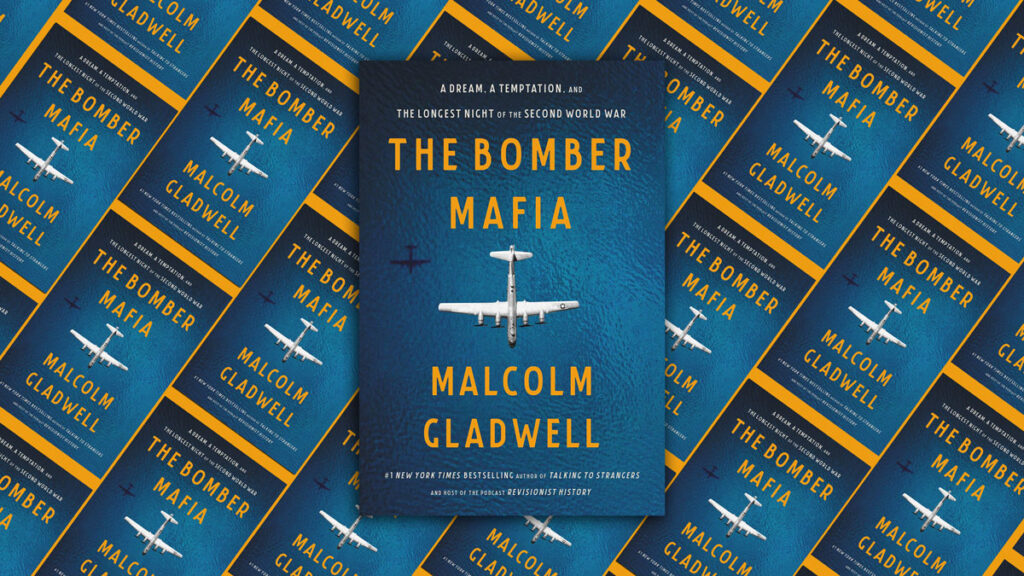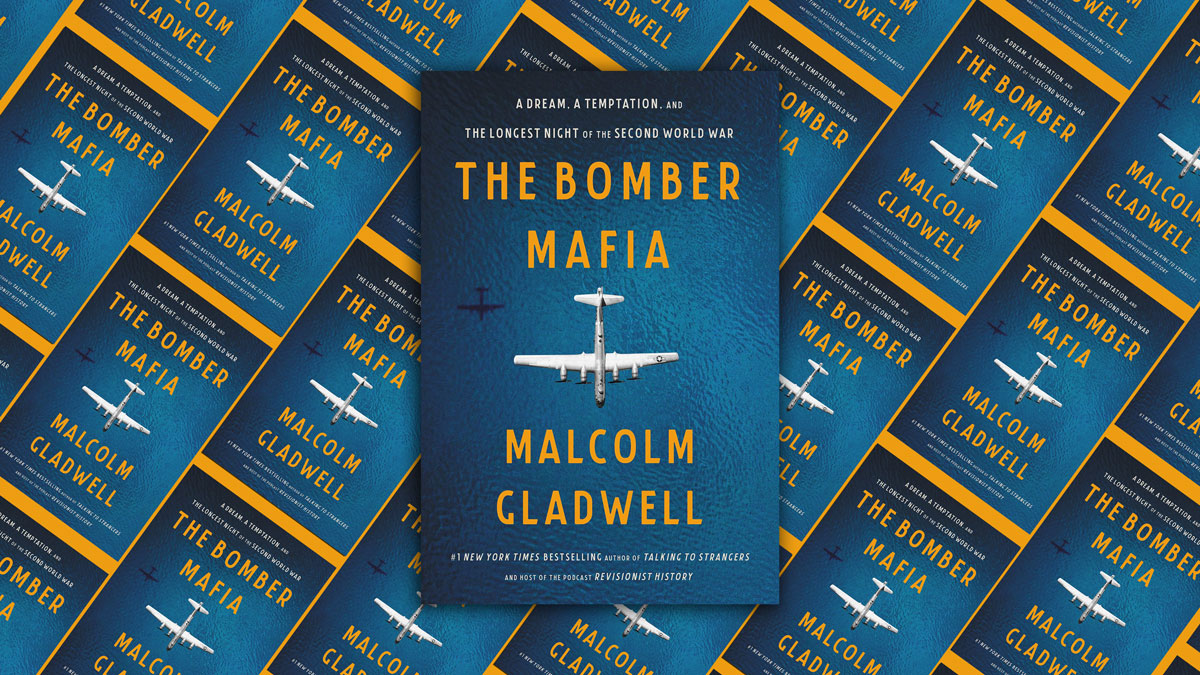
Although a hit ‘The Bomber Mafia’ is less known than previous Gladwell bestsellers
With “Blink” (2007) and “The Tipping Point” as well as “Outliers” Malcolm Gladwell burst onto the scene with a new kind of popular non-fiction. Rather than being another single minded academic focused on a particular specific niche, it was in choosing what phenomena to study, and then taking his now patented unique approach, that he was able to excite and inspire the minds of millions of readers.
Drilling down into the exact aspects of his chosen topics to focus on just what made him choose them in the first place, and doing so with an excited air of adventure and discovery, Gladwell continues to delight, and for some, his entire body of work consists of one page-turner after another. Even his titles, like outliers and the tipping point, though in usage before, after he nailed them into more expansively defined concepts, were brought into more popular use and the widespread level of understanding to a whole new level.
Below we feature a broad selection, including his latest, for fan and the curious alike.
To make it easier they are featured front and center, below, along with descriptions, provided courtesy of the Bookshop (and the various publishers), and with some links for a variety of options of where to purchase.
The Bomber Mafia: A Dream, a Temptation, and the Longest Night of the Second World War
In The Bomber Mafia, Malcolm Gladwell weaves together the stories of a Dutch genius and his homemade computer, a band of brothers in central Alabama, a British psychopath, and pyromaniacal chemists at Harvard to examine one of the greatest moral challenges in modern American history. Most military thinkers in the years leading up to World War II saw the airplane as an afterthought. But a small band of idealistic strategists, the “Bomber Mafia,” asked: What if precision bombing could cripple the enemy and make war far less lethal?
In contrast, the bombing of Tokyo on the deadliest night of the war was the brainchild of General Curtis LeMay, whose brutal pragmatism and scorched-earth tactics in Japan cost thousands of civilian lives, but may have spared even more by averting a planned US invasion. In The Bomber Mafia, Gladwell asks, “Was it worth it?” Things might have gone differently had LeMay’s predecessor, General Haywood Hansell, remained in charge.
Hansell believed in precision bombing, but when he and Curtis LeMay squared off for a leadership handover in the jungles of Guam, LeMay emerged victorious, leading to the darkest night of World War II. The Bomber Mafia is a riveting tale of persistence, innovation, and the incalculable wages of war.
Talking to Strangers: What We Should Know about the People We Don’t Know
How did Fidel Castro fool the CIA for a generation? Why did Neville Chamberlain think he could trust Adolf Hitler? Why are campus sexual assaults on the rise? Do television sitcoms teach us something about the way we relate to one another that isn’t true? Talking to Strangers is a classically Gladwellian intellectual adventure, a challenging and controversial excursion through history, psychology, and scandals taken straight from the news.
He revisits the deceptions of Bernie Madoff, the trial of Amanda Knox, the suicide of Sylvia Plath, the Jerry Sandusky pedophilia scandal at Penn State University, and the death of Sandra Bland–throwing our understanding of these and other stories into doubt. Something is very wrong, Gladwell argues, with the tools and strategies we use to make sense of people we don’t know.
And because we don’t know how to talk to strangers, we are inviting conflict and misunderstanding in ways that have a profound effect on our lives and our world. In his first book since his #1 bestseller David and Goliath, Malcolm Gladwell has written a gripping guidebook for troubled times.
David and Goliath: Underdogs, Misfits, and the Art of Battling Giants
Three thousand years ago on a battlefield in ancient Palestine, a shepherd boy felled a mighty warrior with nothing more than a stone and a sling, and ever since then the names of David and Goliath have stood for battles between underdogs and giants. David’s victory was improbable and miraculous. He shouldn’t have won.
Or should he have? In David and Goliath, Malcolm Gladwell challenges how we think about obstacles and disadvantages, offering a new interpretation of what it means to be discriminated against, or cope with a disability, or lose a parent, or attend a mediocre school, or suffer from any number of other apparent setbacks.
Gladwell begins with the real story of what happened between the giant and the shepherd boy those many years ago. From there, David and Goliath examines Northern Ireland’s Troubles, the minds of cancer researchers and civil rights leaders, murder and the high costs of revenge, and the dynamics of successful and unsuccessful classrooms—all to demonstrate how much of what is beautiful and important in the world arises from what looks like suffering and adversity.
Outliers: The Story of Success
In this stunning book, Malcolm Gladwell takes us on an intellectual journey through the world of “outliers”–the best and the brightest, the most famous and the most successful. He asks the question: what makes high-achievers different?
His answer is that we pay too much attention to what successful people are like, and too little attention to where they are from: that is, their culture, their family, their generation, and the idiosyncratic experiences of their upbringing.
Along the way he explains the secrets of software billionaires, what it takes to be a great soccer player, why Asians are good at math, and what made the Beatles the greatest rock band. Brilliant and entertaining, Outliers is a landmark work that will simultaneously delight and illuminate.
The Tipping Point: How Little Things Can Make a Big Difference
The tipping point is that magic moment when an idea, trend, or social behavior crosses a threshold, tips, and spreads like wildfire.
Just as a single sick person can start an epidemic of the flu, so too can a small but precisely targeted push cause a fashion trend, the popularity of a new product, or a drop in the crime rate.
This widely acclaimed bestseller, in which Malcolm Gladwell explores and brilliantly illuminates the tipping point phenomenon, is already changing the way people throughout the world think about selling products and disseminating ideas.
Most Recent Articles:
- What if “Non-human Biologics” are Watching?
- ‘Most Significant Charges Yet’: Trump Indicted for Trying to Overturn 2020 Election
- But what am I?’ Pee-wee Herman creator and star, Paul Reubens dead at 70
- The Congressional Hearing On UFOs Confirmed the Existence of Aliens? Maybe
Find books on Music, Movies & Entertainment and many other topics at our sister site: Cherrybooks on Bookshop.org
Enjoy Lynxotic at Apple News on your iPhone, iPad or Mac.
Lynxotic may receive a small commission based on any purchases made by following links from this page
